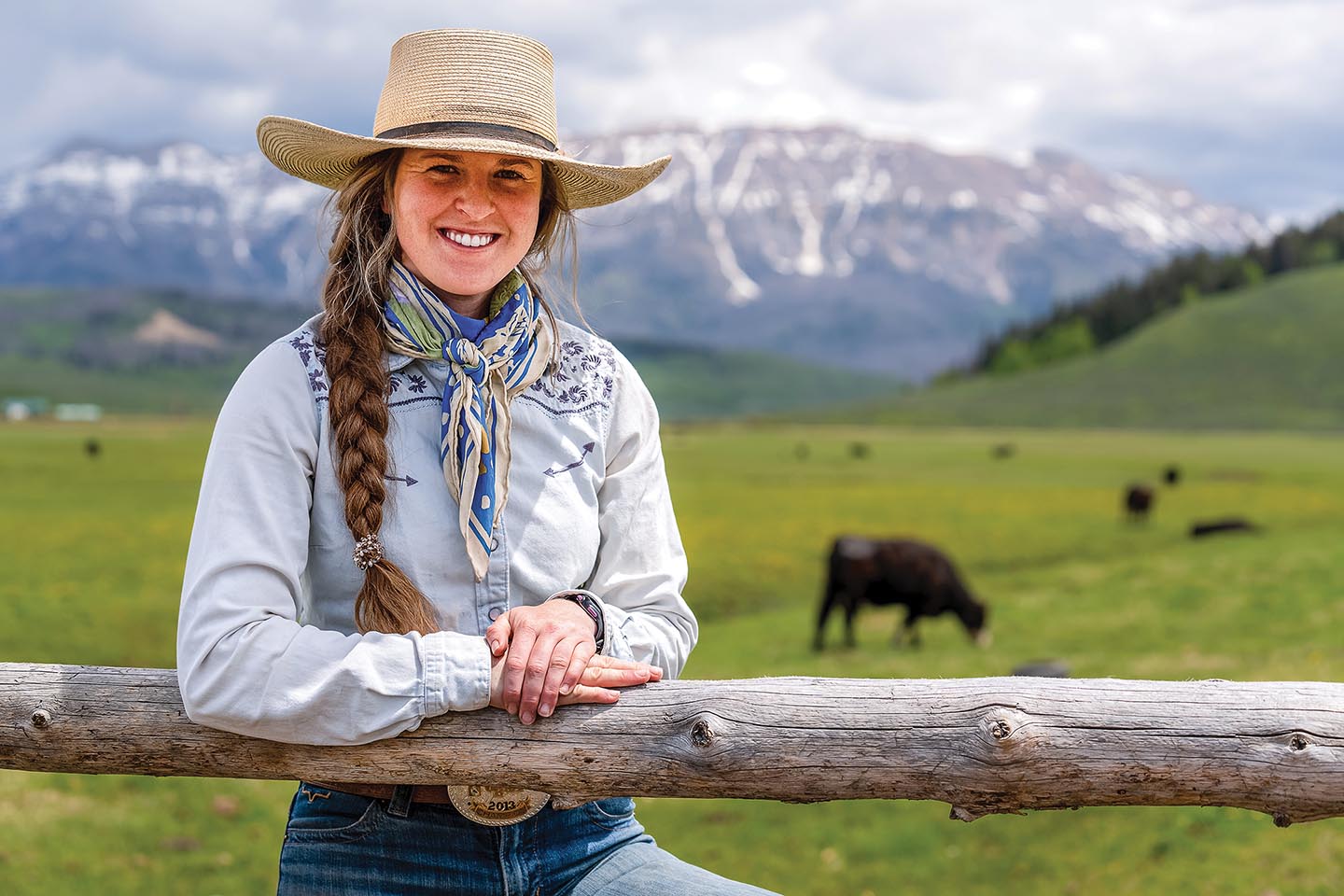She’s learning the ropes of running a ranch.
Faith Hamlin ’18 usually starts her day at 6 a.m. But that doesn’t mean she’s been sleeping.
During the spring months, the manager of the Little Jennie Ranch in Bondurant, Wyo., stays awake all night, running a “calf maternity ward,” birthing calves and tending to mothers — nearly 1,000 of them.
“We’re watching them every hour and a half to check where each heifer is in their labor process and, if they need help, we are pulling calves,” Hamlin explains. “It’s a fine balance of letting her naturally do what her instincts want and intervening when we have to.”
It’s a balance Hamlin knows well. Since 2019, she has been the manager of the Little Jennie, a 3,000-acre working cattle ranch about an hour from Jackson Hole. She oversees a crew of more than 25 workers, who help her manage hundreds of chickens, horses, and a handful of herding dogs. But the Angus-Hereford cross cows — which number into the thousands — are the ranch’s main business.
Though she looks every inch the born-and-bred rancher, Hamlin spent her early childhood in Ohio. Her family moved to Wyoming when she was 10, and through it all, she recalls listening to her father wax poetic about the “wholesome ranching lifestyle” and his dream to own a family ranch someday.
“My dad had painted this vision for my brother and me,” says Hamlin. “And I completely bought into that.”
In 2015, when Hamlin was off at Colgate, her parents learned that the storied Little Jennie ranch was up for sale. The property was a Western landmark known for its sweeping panoramic views of Bridger-Teton National Forest and called, in the real estate listing, “one of the crown jewels of the American West.” Case in point: the 1953 western classic Shane was filmed nearby.
Her parents purchased the property in 2017, and while Hamlin was happy to lend a hand during her school breaks, she never anticipated making the ranch her career.
“I was considering doing research or analyst work on the Middle East,” says Hamlin, who majored in political science with a minor in Islamic studies.
But she found herself loving her work at the ranch — which wasn’t a surprise to those who know her.
“Faith has always loved animals, the outdoors,” says dad, Mark ’78. “She’s got incredible intestinal fortitude. I’ve always said there’s just no quit in this girl.”
In the winter of 2019, a mutual friend arranged a meeting between Hamlin and two ranchers in nearby Savery. The friend thought Hamlin might find the couple interesting — a lawyer and an MBA grad who used their business savvy to run a small cattle ranch.
“Here were these highly educated people who were passionate about cattle and ranching,” she says. “I sat at their kitchen table for hours, asking the silliest questions.”
The couple sent her home with piles of literature and an offer to serve as ranching mentors.
The encounter helped Hamlin see the ranching business — and the close-knit rancher community — in a new light. Their guidance also helped her realize how many elements of her Colgate education would come into play in the ranching business, especially a senior-year course on environmental policy.
“We studied complex systems and cultures, and on the ranch, we’re dealing with the normal business obstacles and challenges, on top of animals, the weather, and equipment,” she says. “Agriculture is infinitely complicated.”
Back at the Little Jennie, Hamlin began to take on a larger role, learning as she went. When the then-manager moved on to a new job, Hamlin’s father was confident enough in his daughter to hand over the reins. Soon, she was handling everything from cattle negotiations and doctoring animals to managing calving season.
“Faith took to it immediately,” says Mark. “I basically started working for her, and now she’s got this place running like a scalded dog.”
For Hamlin, there’s always a new challenge. Her latest project: bringing Little Jennie products directly to consumers.
“Right now, I’m selling live animals to other farmers and ranchers, but I am taking more and more animals to market at local butcher shops,” she explains. “I really believe in people trying to buy their food as locally as possible, and I want our meat to be accessible to folks.”
That means networking with local slaughterhouse owners, visiting farmers’ markets, and talking with other purveyors — work on the business side that, Hamlin admits, has taken a backseat during the non- stop grind of calving season.
“It can be overwhelming, but there’s also immense pride in doing this work,” she says. “It’s too much blood, sweat, and tears not to be proud of what we do here.”

